初中英语形容词和副词课件
初中英语语法课件-副词的基本用法
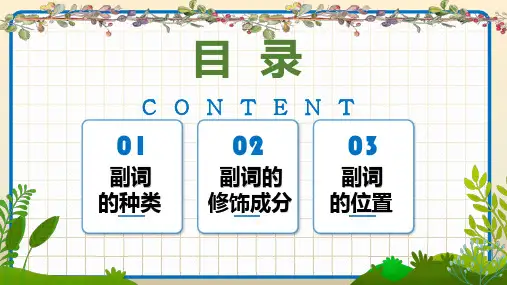
频度副词
usually 通常 never 从来不 ever 曾经
often 经常 sometimes 有时 always 总是 hardly 几乎不 rarely 极少 seldom 极少
疑问副词
how 怎样
when 什么时候 where 哪里
why 为什么 how 如何
how long 多长
how often 多久一次 how far 多远
4. 副词修饰基数词时,通常放在被修饰基数词的前面。 Her grandpa is over eighty, but he is healthy. 她的爷爷八十多岁了,但是很健康。
1. The night was very ___, so he had to take off
his shoes ___.
2. 副词修饰形容词时,通常放在该形容词的前面。 He is a very funny boy. 他是一个非常有趣的男孩。 The boy is too young. He can’t carry the heavy box. 这个男孩太小。他搬不动这个重箱子
3. 副词修饰其它副词时,通常放在被修饰副词的前面。 The girl swims very well. 这个女孩游泳游地得非常好。 He works very hard. 他工作非常努力。
4. How ___ the girls are playing! A. happy B. happier C. happyly D. happily
THE END
A. quiet; quietly B. quite; quickly
C. late; quick
D. quite; quietly
2. I saw the film two days ___. A. ago B. before C. after D. late
初中英语形容词精品PPT课件
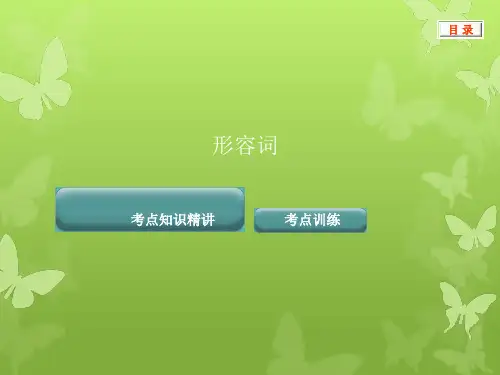
目录
英语和语文一样重要。 ②否定句中的结构:“A...+not+as/so+形容词原级+as+B” I am not so fast as Lucy.我没有露西快。 ③表示“A是B的……倍”时,用“A...+倍数+as+形容词原级+as+B” 结构。(两倍:twice;三倍以上:数字+times) Our school is three times as big as his. 我们学校是他学校的三倍大。 This table is twice as long as that one.
dear—expensive,broken—worn out,hard—difficult,
fine—well,ill—sick,nice—kind/fine/good/beautiful,
alone—lonely
目录
10.常见形容词的反义词归类。 bad—good,big—small,large—small,black—white, busy—free,cold—hot,cool—warm,dead—living/alive, dry—wet,empty—full,fast—slow,high—low, ill—well,little—much,open—closed,same—different, safe—dangerous,southern—northern,less—more, least—most,worse—better,worst—best,cheap—dear/ expensive,easy—hard/difficult,possible—impossible, happy—unhappy/sad,early—late
目录
11.形容词比较等级的构成:原级、比较级和最高级。 (1)规则变化
(完整版)初中英语常用形容词副词
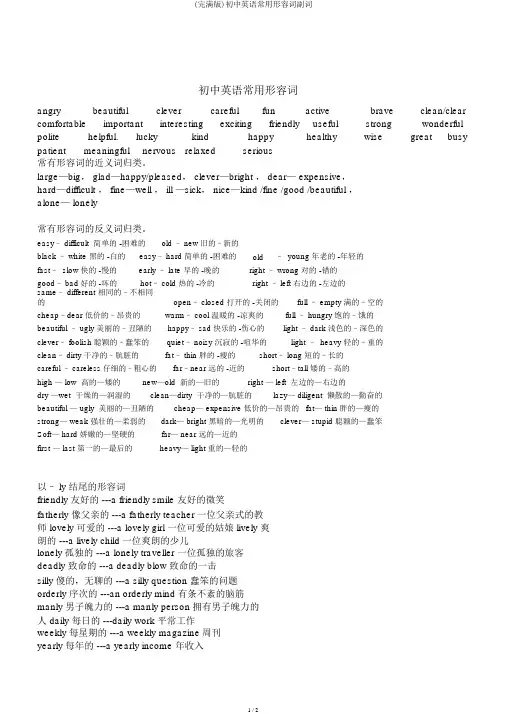
初中英语常用形容词angry beautiful clever careful fun active brave clean/clear comfortable important interesting exciting friendly useful strong wonderful polite helpful.lucky kind happy healthy wise great busy patient meaningful nervous relaxed serious常有形容词的近义词归类。
large—big, glad—happy/pleased, clever—bright , dear— expensive,hard—difficult , fine—well , ill —sick, nice—kind /fine /good /beautiful ,alone— lonely常有形容词的反义词归类。
easy– difficult 简单的 -困难的old – new 旧的–新的black – white 黑的 -白的easy– hard 简单的 -困难的old– young 年老的 -年轻的fast– slow 快的 -慢的early – late 早的 -晚的right – wrong 对的 -错的good– bad 好的 -坏的hot– cold 热的 -冷的right – left 右边的 -左边的same– different 相同的–不相同的open– closed 打开的 -关闭的full – empty 满的–空的cheap–dear 低价的–昂贵的warm– cool 温暖的 -凉爽的full – hungry 饱的–饿的beautiful – ugly 美丽的–丑陋的happy– sad 快乐的 -伤心的light – dark 浅色的–深色的clever– foolish 聪颖的–蠢笨的quiet– noisy 沉寂的 -喧华的light – heavy 轻的–重的clean– dirty 干净的–肮脏的fat– thin 胖的 -瘦的short– long 短的–长的careful – careless 仔细的–粗心的far–near 远的 -近的short–tall 矮的–高的high — low 高的—矮的new—old 新的—旧的right — left 左边的—右边的dry —wet 干燥的—润湿的clean—dirty 干净的—肮脏的lazy— diligent 懒散的—勤奋的beautiful — ugly 美丽的—丑陋的cheap— expensive 低价的—昂贵的 fat— thin 胖的—瘦的strong— weak 强壮的—柔弱的dark— bright 黑暗的—光明的clever— stupid 聪颖的—蠢笨Soft— hard 娇嫩的—坚硬的far— near 远的—近的first — last 第一的—最后的heavy— light 重的—轻的以– ly 结尾的形容词friendly 友好的 ---a friendly smile 友好的微笑fatherly 像父亲的 ---a fatherly teacher一位父亲式的教师 lovely 可爱的 ---a lovely girl 一位可爱的姑娘 lively 爽朗的 ---a lively child 一位爽朗的少儿lonely 孤独的 ---a lonely traveller 一位孤独的旅客deadly 致命的 ---a deadly blow 致命的一击silly 傻的,无聊的 ---a silly question 蠢笨的问题orderly 序次的 ---an orderly mind 有条不紊的脑筋manly 男子魄力的 ---a manly person 拥有男子魄力的人 daily 每日的 ---daily work 平常工作weekly 每星期的 ---a weekly magazine周刊yearly 每年的 ---a yearly income 年收入副词的分类副词按词汇意义可分为:方式副词: well , fast,slowly , carefully , quickly程度副词: very , much, enough, almost, rather, quite地点副词: here, there, out, somewhere, abroad, home哪些单词既是形容词又是副词初中常有的有 :fast, hard, enough, early, late,t,high,far方式副词:well (好地)fast(快地 )carefully(小心地 )quickly (快地)sadly(伤心地)badly (严重地,特别)carelessly(粗心地)slowly (慢慢地)politelyproperly (合适地,完满地)(有礼貌地)proudly (骄傲地),successfully (成功地)happily (快乐地)angrily (生气地,气愤地)。
中考英语形容词和副词语法讲解--形容词和副词的比较等级
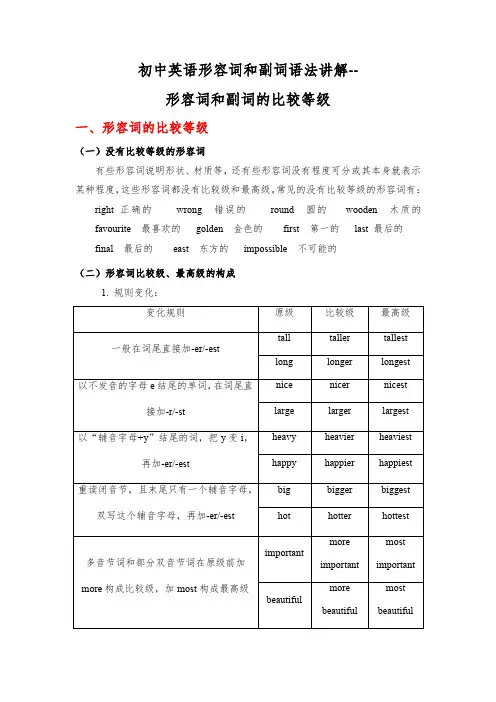
初中英语形容词和副词语法讲解--形容词和副词的比较等级一、形容词的比较等级(一)没有比较等级的形容词有些形容词说明形状、材质等,还有些形容词没有程度可分或其本身就表示某种程度,这些形容词都没有比较级和最高级。
常见的没有比较等级的形容词有:right 正确的wrong 错误的round 圆的wooden 木质的favourite 最喜欢的golden 金色的first 第一的last 最后的final 最后的east 东方的impossible 不可能的(二)形容词比较级、最高级的构成1. 规则变化:变化规则原级比较级最高级一般在词尾直接加-er/-esttall taller tallestlong longer longest以不发音的字母e结尾的单词,在词尾直接加-r/-st nice nicer nicest large larger largest以“辅音字母+y”结尾的词,把y变i,再加-er/-est heavy heavier heaviest happy happier happiest重读闭音节,且末尾只有一个辅音字母,双写这个辅音字母,再加-er/-est big bigger biggest hot hotter hottest多音节词和部分双音节词在原级前加more构成比较级,加most构成最高级importantmoreimportantmostimportant beautifulmorebeautifulmostbeautiful2.不规则变化:原级比较级最高级good/well better bestbad/ill worse worstmany/much more mostlittle less leastold older/elder oldest/eldestfar farther/further farthest/furthest(三)形容词比较等级的用法1.原级的用法(1)肯定句中用“as+原级形容词+as”表示双方在程度、特征等方面相同。
初中英语形容词和副词
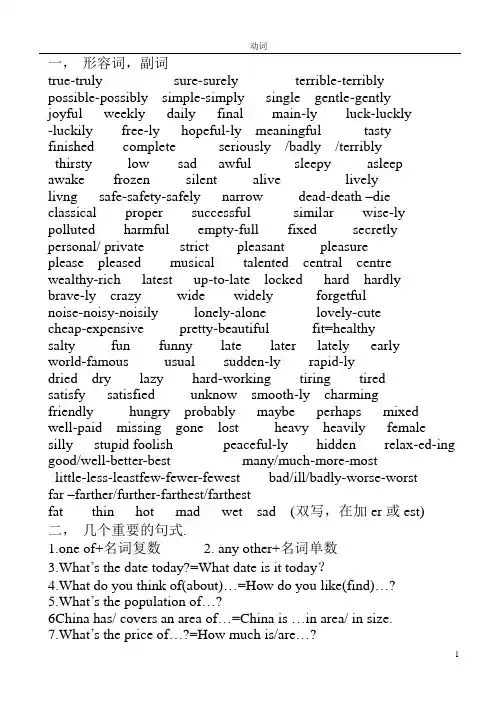
一,形容词,副词true-truly sure-surely terrible-terriblypossible-possibly simple-simply single gentle-gentlyjoyful weekly daily final main-ly luck-luckly-luckily free-ly hopeful-ly meaningful tastyfinished complete seriously /badly /terriblythirsty low sad awful sleepy asleepawake frozen silent alive livelylivng safe-safety-safely narrow dead-death –die classical proper successful similar wise-ly polluted harmful empty-full fixed secretly personal/ private strict pleasant pleasureplease pleased musical talented central centrewealthy-rich latest up-to-late locked hard hardlybrave-ly crazy wide widely forgetfulnoise-noisy-noisily lonely-alone lovely-cutecheap-expensive pretty-beautiful fit=healthysalty fun funny late later lately earlyworld-famous usual sudden-ly rapid-lydried dry lazy hard-working tiring tiredsatisfy satisfied unknow smooth-ly charmingfriendly hungry probably maybe perhaps mixedwell-paid missing gone lost heavy heavily female silly stupid foolish peaceful-ly hidden relax-ed-ing good/well-better-best many/much-more-mostlittle-less-leastfew-fewer-fewest bad/ill/badly-worse-worstfar –farther/further-farthest/farthestfat thin hot mad wet sad (双写,在加er或est) 二,几个重要的句式.1.one of+名词复数2. any other+名词单数3.What’s the date today?=What date is it today?4.What do you think of(about)…=How do you like(find)…?5.What’s the population of…?6China has/ covers an area of…=China is …in area/ in size.7.What’s the price of…?=How much is/are…?=How much do/does …cost?8.What’s the weather like today?=How is the weather?9.What day is it today?10.How are you?=How are you doing?11. can’t be too+adj.12.What’s the weight of..?=How much do/does …weigh?13.What do you think makes him so clever?14. so/such… that15.How much do you know about …?=How well do you know…?16.Which is the way to…? Can you tell me which is the way to the zoo?17.I wonder what is wrong with her.18. the key to the door the answers to the questions19.appear take place happen 不可用被动语态,主动语态表被动意义。
初中英语语法大全课件

(1)构成名词的后缀常用的有-ence,-(e)r/ -or (从事某事的人),-ese (某地人),-ess (雌性),-ful (一……),-ian (精通……的人),-ist (专业人员),-ment (性质;状态),-ness (性质;状态),-tion(动作;过程)等。例如: differ不同于→difference区别 write写→writer作家 Japan日本→Japanese日本人 act表演→actress女演员 mouth口→mouthful一口 music音乐→musician音乐家 racial种族的----racialist种族主义者
01
合成形容词
02
名词+形容词snow-white雪白的
03
名词+现在分词English-speaking讲英语的
04
名词+to+名词face-to-face面对面的
05
名词+过去分词man-made人造的
06
数词+名词one-way单行的
07
数词+名词+形容词two-year-old两岁的
动词转化为名词
很多动词可以转化为名词,大多意思没有多大的变化(如下①);有时意思有一定变化(如下②);有的与一个动词和不定冠词构成短语,表示一个动作(如下③)。例如:
Let's go out for a walk.我们到外面去散散步吧。
He is a man of strong build.他是一个体格健壮的汉子。
构成副词的常用后缀有-ly (主要用于形容词之后表示方式或程度),-ward(s) (主要用于表示方位的词之后表示方向)。
例如:
angry生气的→angrily生气地
to到→towards朝……,向……
初中英语语法——形容词副词
A living language should be learned orally(口头上). (活的语言应该从口头上学)(被动句) We have a living hope that you will succeed. (我们强烈地希望你能成功) Is she still alive? (她还活着吗?) They are the happiest children alive. (他们是活着的最开心的孩子)
⒀ gone、lost与missing
gone表示“丢了,没了”,含一去不复返 的意思,也可以表示“死了”,作表语或 宾补,不可以作定语; lost表示“丢失”,含难以找回的意思, 可作定语、表语或宾补; missing表示“失踪了,不见了”,强调 某人物不在原处,可作定语、表语或宾补。
My fever(高烧) is gone, but I still have a cough. (发烧消退了,但我仍然咳嗽) The parents found the lost child at last. (家长终于找到了迷路的孩子) My dictionary is missing.Who’s taken it away? (我的字典不见了,谁拿走了?) For more detailed information(详情) of the missing girls, please visit our website(网址). (如果想知道失踪女孩们的 详情,请访问我们的网站)
⑿ special与especial
表示事件不同寻常、过分或特殊时,两个词可 互换,但special较为常用。另外,special还可 以表示特别的目的。 She pays (e)special attention to clothes. (她非常注重着装) These are special chairs for small children. (这些是专门给小孩子的椅子)
初中英语形容词和副词
例题: 1. She was _____ (luck) to lose her money when she went shopping last weekend. [04西宁] 2. This kind of skirt looks __ and sells__. [04天津] A. nice; well B. nice; good C. well; well D. good; nice
3.某些描述感觉或心情的形容词: glad 高兴的 pleased 高兴的 sorry 难过的 I’m glad to hear that. 听到这消息我很高兴。 You will be sorry about this later. 对这件事你以后会后悔的。 We are very pleased with the plan. 我们对这个计划很满意。 【注】若用于其他意思,则可用作定语,如 glad 表示“(感到)高兴的”时,只用作表语;若表示“令人高兴的”,则只用作定语(glad news 好消息)。
A
A
4).The house smells as if it hasn’t been lived in for years. A. Little white wooden B. little wooden white C. white wooden little D. wooden white little 5). Students are required to take part in the boat race. A. Ten strong young Chinese B. Ten Chinese strong young C. Chinese ten young strong D. Young strong ten Chinese
初中英语专题讲解——-形容词
形容词★高考考试双向细目表★形容词的作用★教学起点★对于比较级的考查,淡化了结构,注重深层语义。
“比较”的意思并不是直接能够从“结构”中看出。
题干中有时出现比较级的标志词than,有时则需要考生根据语言环境去判断;加强形容词、副词词义的辨析考查,尤其是那些常用的形容词、副词;★互动研学★1. 形容词作表语The Summer Palace is very beautiful.颐和园非常美丽。
2. 形容词作宾语补足语We found the text very difficult. 我们觉得这篇课文很难。
You should keep your class room clean. 你们应该保持教室清洁。
3. 形容词相当于副词,作状语We arrived at home very late,sate and sound.我们到家很晚,安然无恙。
He came home,dead tired. 他回到家来,累得要死。
4. 形容词作定语This is beautiful rose. 这是二朵美丽的玫瑰花。
Let me tell you something interesting.我来告诉你一些有趣的事。
注意:(一)形容词作定语的位置(1)修饰something,anything,everything,nothing,everyone, anybody等复合不定代词时要后置。
如: Is there anything important in the article?这篇文章里有什么重要的东西吗There is something difficult in the lesson.这堂课里有些东西很难。
(2)形容词后面有介词短语或不定式短语时,要后置。
如: He is a worker worthy of praise.他是一个值得表扬的工人。
It is a problem difficult to solve.这是一个难于解决的问题。
5.初中英语语法讲解-形容词副词
b.修饰形容词、副词时,放在它所修饰的词的 前面。 He studies much harder now. 现在他学习努力多了。 The room is big enough to hold fifty persons. (enough修饰形容词) 这个房间够大的可以容纳50人。 He runs fast enough.(enough修饰副词) 他跑得够快的。
没有比较等级的积累形容词:
(1)表示“终极”意义或绝对概念的形容词或副词。 如:absolute(ly), blind, dead, excellent, entire, living, full, perfect(ly), round, relative, wrong等。 (2)表示时间、方位或方向的形容词或副词。如: back, backward, forward, front, past, monthly, weekly, present, southern, vertical等。 (3)部分表示事物性质、物质材料或结构成分的形容 词。如:atomic, cultural, economic, educational, golden, political, scientific, silken, urban, wooden等。 (4)本身具有“最”或“唯一”概念的形容词。如: maximal, mere, minimal, matchless, sole, only unique等。
请提问
BREAK
副词
副词的基本用法
副词在句子中修饰动词、形容词、副词或 整个句子。用来表示时间、场所、状态及 程度。
(1)时间副词 ①表示大体时间:now,then,yesterday,today, tonight,before,justnow,recently,so far ②表示频率: always,usually,often,sometimes.seldom,never ③其它作用:already,yet,late,early,soon,at once,immediately,atfirst,at last,finally
